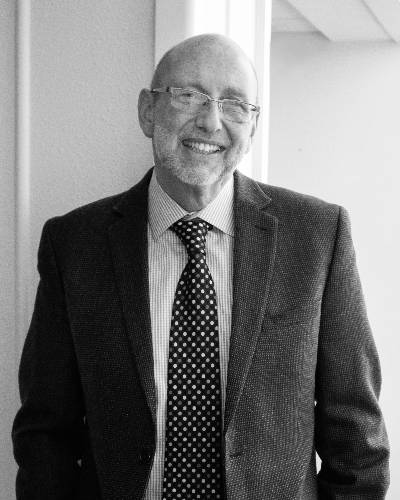
The end-of-the-semester column is always challenging to write, primarily because my impulse is to thank all the people who have contributed to the successes that our School of Theatre and Dance have experienced 2018-19, from donor/friend Herb Armstrong to our Dean Noel Zahler. I tend to want to identify everyone who has helped us succeed this year, but that has the potential of devolving into some sort of embarrassing award acceptance speech, and I loathe them, so....
...at the risk of being too sentimental, allow me to share a moment.
A few months ago, I was fortunate enough to meet a young artist, Allen Smith, the Presidential scholar from the School of Art. A brief conversation led to longer ones, where we shared not only family histories, but also aesthetic philosophies and, this led to our beginning to collaborate: the painter and the playwright.
This is not the first time I've shared projects with folks from art: my first semester here, Jarred Elrod and I created a project that we called I'm Sorry You're Happy, where I threw my words at Jarred, and he responded with images, and vice versa. It was the first time I, as a playwright, had my words in an art gallery. And last year, a friendship with Justin Glosson from Music led to his being the first musician to join our devised intensives in Marfa.
Allen is a painter, one whose work is provocative, internal, reflective, and important. And while his talents may be a bit beside the point, they illustrate so much about why Texas Tech is a place that not only encourages the arts to cross boundaries, but also creates the path that helps to define the journey.
As you know, our college helps us to connect unlikely disciplines. Our faculty work with medicine, kinesiology, students on the spectrum, Alzheimer's organizations, and architecture, just to name a few areas usually not traditionally associated with theatre and dance. We make a lot out of understanding and overcoming boundaries, but maybe not enough; in other words, it's only through defining a boundary that we know the benefits of crossing them. An analogy that may be useful: as a playwright, I must truly know traditional structure before I can begin to break it apart.
Meeting Allen, then, has inspired me, not unlike connecting with photographer Aaron Hegert, also from the School of Art, to explore connections between his collective and our devised theatre. No idea where these collaborations will lead, nor do I know where Allen's art and my writing will intersect, but I do know one thing: I will be a better artist, director, and human being when exploring these connections.
And that's what makes our College one of the best in the country. Our doctoral program is truly interdisciplinary, forcing students to understand how art, music, and theatre/dance influence one another. This, in turn, affects all of us, from BA to MFA to MA to BFA. I have never appreciated conservatory training since it approaches education from such a narrow viewpoint. Sure, there's much to be said for deeply exploring one subject, but while that may improve our craft, it does not necessarily consider the context within which that craft exists, at least not as thoroughly. In 2019, fine tuning our talents is important, but not more than understanding the world in which that talent must exist.
So as I look back at a year in which we embraced Lubbock (again) as our campus, in which we held an entire season in site-specific and found spaces, in which we have a record number of students invited to the Kennedy Center American College Theatre Festival, in which my mentee and PHD student Randall Rapstine embraced our Marfa-devised theatre model for his upcoming Canterville, in which we continue to partner with international schools in Hong Kong and Turkey, and in which our School continues to privilege new works, I'm most thankful for an environment that actually allows me to collaborate with Allen and Aaron.
Our School of Theatre and Dance not only celebrates collaboration, but encourages it—in all the right ways—and the interdisciplinary nature of how we live, study, and advance best exemplifies what it means to truly embrace the world in which we live. As we prepare for WildWind, Marfa, and yep, even our next journey to the Provincetown Tennessee Williams Festival in September, introducing our students to best artists and practices from around the globe, it's reassuring to know that Texas Tech and our School truly cares about the transformative potential of the arts.
